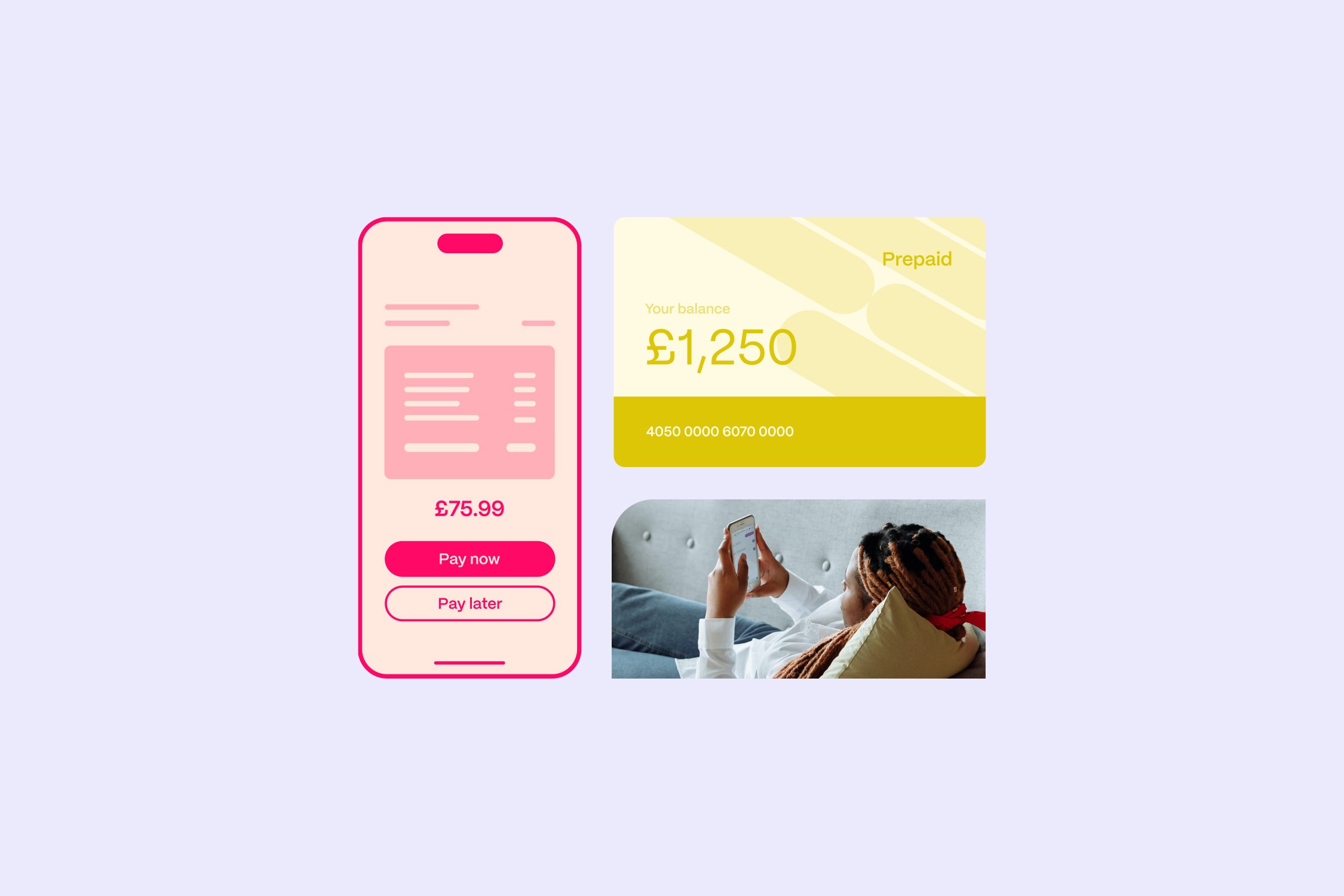Businesses are swiftly moving away from cash and physical cards towards virtual cards to make and manage payments and expenses. This transformation isn't just a shift in form - it's a strategic move that brings efficiency, security, and enhanced financial control.
What are virtual cards?
Virtual cards, also known as VCNs, are electronically generated credit or debit cards that can be configured for a one-time use or for a specific timeframe.
They function similarly to physical cards and have unique details such as virtual card number (VCN), expiry date, and security code (CVV). These cards are issued by financial institutions or fintech companies, and businesses can easily manage them via web interface or API. Cardholders can use the virtual cards to make payments online or in store, if enrolled in mobile wallets such as Apple Pay or Google Pay.
Types of virtual cards
Virtual cards come in various forms, each designed to meet specific needs and use cases. The two most common types are:
Single-use virtual cards
These cards are designed for a one-time transaction and automatically expire afterward. They are ideal for secure online purchases or specific business payments, reducing the risk of fraud and unauthorised usage.
Multi-use virtual cards
Unlike single-use cards, multi-use virtual cards can be used for multiple transactions. These cards are typically associated with a spending limit or validity period, making them suitable for recurring subscriptions, vendor payments, or employee expense management.
Both types of virtual cards offer enhanced security, customisable controls, and a seamless way to manage payments in a digital-first world.
The rise of B2B virtual card payments
The advancement of the digital era has revolutionised the way corporate payments are made, and it’s estimated that up to 80% of all B2B transactions will be digital by 2025.
Card payments have long dominated the B2B payment space, but as businesses make more digital payments, physical cards aren’t the most effective tools for supplier payments and expense management when operating at scale. This is due to the lack of controls, security, and high card fees that are associated.
Businesses face economic uncertainty and with the volume of fraud rising within B2B payments, virtual cards are proving to be a better alternative thanks to their enhanced security, ability to streamline back-office operations, and provide greater control.
A fast-growing number of Online Travel Agencies (OTAs) and companies across industries are taking advantage of the efficiency that virtual cards offer to better manage B2B payments, with less manual interactions. And the rapid adoption of virtual cards shows no signs of stopping with the volume of transactions predicted to reach 175 billion by 2028.
How do virtual cards work?
The process of generating and using virtual cards is both simple and highly secure. Here's how it typically works:
- Card generation: Virtual cards are created by financial institutions or payment platforms such as Edenred Payment Solutions. Depending on your requirements, the card can either be single-use or have a set validity period.
- Instant issuance: Once generated, the card details (number, expiration, and CVV) are delivered digitally and can be used immediately.
- Secure transactions: During payments, the virtual card details are used instead of a physical card, masking the actual data and minimising fraud risks.
Practical applications of virtual cards
Businesses, like VINCI and Bouygues, have found a game-changing ally in virtual cards when it comes to making corporate payments. Whether it's settling bills for marketing ads and subscriptions, or to help employees manage their expenses, virtual cards offer the perfect blend of control and convenience. By eliminating the need for constant managerial approval, such as providing one-time passwords (OTPs), employees gain autonomy to work independently. The granular control features allow managers to set specific limits and parameters, preventing overspending and enhancing financial oversight.
In the travel space, OTAs have largely embraced the use of virtual cards. Generally, OTAs make high volumes of payments to their suppliers to book transport and accommodation at the best price on behalf of their clients. As virtual cards are instantly generated, they provide the speed and efficiency OTAs require to make online payments at scale.
Another use of virtual cards is within the buy-now-pay-later (BNPL) market. As a growing number of merchants adopt flexible payments methods, virtual cards can be a powerful tool to facilitate payments between the BNPL provider, such as Oney, and the merchant. The virtual card is generated during the online checkout, for the exact amount of the transaction, and is processed instantly, paying the merchant, while the BNPL provider will collect the money from the consumer in instalments.
Virtual card benefits for businesses
Let’s deep dive into the benefits of virtual cards for businesses.
Reduced fraud risk
In 2022 alone, 65% of businesses were victims of payments fraud attacks and attempts. B2B payments can be a goldmine for fraudsters as usually these transactions are for larger amounts, and it can take longer for businesses to locate the attack and take action.
With their digital nature, virtual cards remove the obvious threat of loss and theft. What’s more, virtual cards can be configured to be used for a specific transaction, meaning the card will only be valid once. This eliminates the need to store card details online, which can leave them vulnerable to cyberattacks.
Improved control
Traditional payment methods, like paper checks and wire transfers, make it challenging for businesses to track payments, monitor cashflow, and promptly identify discrepancies. With virtual cards, businesses have the flexibility to set spending limits for cardholders, specify Merchant Category Codes (MCC – which are authorised merchant types where the funds on the virtual cards can be used at), and amount, providing improved control and better cashflow management.
Streamlined reconciliation
As businesses continue to embrace virtual cards, they no longer have to keep track of paper receipts and unidentifiable transactions. Virtual cards make reconciliation simple thanks to the information that businesses can append to each transaction, such as Passenger Number Reference (PNR) in the travel space, to easily identify payments. With nearly £320 million worth of employee time spent on reconciliation tasks, virtual cards allow businesses to quickly locate and align payments, while reducing the administrative burden and manual processing for Finance teams.
Greater productivity
The rise of digital payments has undoubtedly brought convenience to consumers, who can now pay with a simple tap or click. As people get used to making digital payments in their personal lives, employees seek the same simplicity for corporate payments. Virtual cards are generated instantly, so users don’t need to wait for a physical card to arrive. They can be utilised straight away for online payments and in store, if enrolled within mobile wallets. This helps employees to make purchases conveniently, anytime, anywhere, with maximum productivity.
Enhanced security
Online payment security is a top priority for most modern finance teams. The risk of fraud and data breaches are a constant concern, making it crucial to find solutions that protect sensitive information and financial assets.
Because virtual cards don’t divulge sensitive account information, they're much safer for online transactions. Each card can be restricted to a single use or designated to specific vendors, reducing the risk of fraud.
How to implement virtual cards for your business
If you're considering virtual cards for your business, onboarding with a reputable provider is an essential first step. Platforms like Edenred Payment Solutions specialise in helping businesses implement scalable card issuance programs. Here's how you can get started:
1. Define your needs
Identify what your business intends to use virtual cards for. Think about whether you need instant card generation, prepaid solutions, or specific digital wallet support. Every business has unique requirements that demand a unique, bespoke solution. Define your criteria and speak to potential virtual card providers about your needs and plans.
2. Choose a provider
Choosing the right virtual card provider is the most important step. As every virtual card program is different, so you’ll want a partner that knows the industry well, offers robust and customisable options, and complies with Payment Card Industry (PCI) standards, ensuring security and regulatory adherence.
Reach out to a member of our team to discover more of what Edenred Payment Solutions has to offer.
3. Integration and issuance
Leverage API-powered platforms to issue your cards and integrate them into your existing business systems seamlessly.
Implementing virtual cards with Edenred Payment Solutions
Edenred Payment Solutions has long been supporting companies and OTAs with flexible and customisable virtual cards. Our solution is specifically designed for Issue Cards payments and enables businesses to have a single account that can handle an unlimited number of virtual cards transactions concurrently.
With our solution, the virtual cards draw funds directly from a single corporate account, eliminating the need to prefund cards individually in advance. This provides greater operational efficiency and improved cashflow management as capital is not tied up across different cards. Learn more about our Lean Funding model here.
Working with Edenred Payment Solutions significantly reduces regulatory complexities, meaning businesses can get up and running with this solution quickly. Once the funding account is created, either with a UK Account Number and Sort Code or with an EU IBAN depending on business requirements, companies can top up the funds in their account through the standard banking schemes such as Faster Payments or SEPA.
At this point, businesses can start creating and managing their virtual cards via API or web portal.
The API
This is ideal for businesses that need to make high volumes of transactions and prefer single-use virtual cards to drive efficiencies through automation. Using the API, businesses can make payments, create new cards, and manage them with ease. Developers can test the API in our sandbox environment, and easily integrate virtual card payments into their software with our documentation and guidance. Try our API here.
The web portal
This is useful for businesses that need to further customise card usage behaviours. Through the portal, managers can check the account balance and card activity, issue cards instantly, set spending parameters for each user, manage cards, add new cardholders, or remove existing ones in real time to reduce the risk of funds misuse. Cardholders can work autonomously as payments are automatically validated, provided they meet the preconfigured criteria. Learn more here.
Conclusion
The move towards virtual cards is revolutionising the way payments are made in the B2B space. The multifaceted applications of virtual cards, and their seamless integration within payment flows, position them as the forefront of modern payment technology.
As businesses navigate the complexities of a digital economy, leveraging the benefits of virtual cards becomes imperative for sustained growth, efficiency, and financial agility.
FAQs
What are virtual cards?
Virtual cards are digital payment cards that exist electronically rather than in physical form. They are typically used for online transactions, offering a secure and trackable way to make payments without exposing sensitive account information.
How do virtual cards enhance security?
Virtual cards reduce the risk of fraud by generating a unique card number for each transaction or vendor. Since these numbers are not tied directly to the primary account, unauthorised access or misuse is significantly minimised.
Can virtual cards be used for recurring payments?
Yes. Virtual cards can be set up for recurring payments by assigning them to a specific subscription or vendor, making it easier to track and manage ongoing expenses.
Are virtual cards accepted everywhere?
Virtual cards can be used anywhere that accepts card payments online or through mobile platforms. However, they may not work in settings where a physical card is required, such as certain in-person transactions.
How can my business implement virtual cards?
Businesses can implement virtual cards through providers like Edenred Payment Solutions. These solutions can be tailored to your company’s needs, simplifying expenditure tracking and enhancing financial control.
Can you have virtual debit and credit cards?
Yes, virtual cards can be issued as either debit or credit cards depending on your financial needs and the provider’s offerings. Virtual debit cards are linked directly to a bank account or funds, while virtual credit cards function like traditional credit cards, allowing for transactions within a set credit limit. Both types offer similar convenience and security features
What are B2B virtual cards?
B2B virtual cards are widely available and are specifically designed to facilitate secure and efficient transactions between businesses. These cards can be used for purposes such as supplier payments, subscription management, and travel expenses. By using B2B virtual cards, companies can enhance their financial oversight, streamline payment processes, and reduce the risk of fraud.
We’re here to help you design payment solutions perfect for your business
Discover our customisable solutions that take the stress out of managing corporate payments and enable businesses to optimise budget and cashflow management. Get in touch



